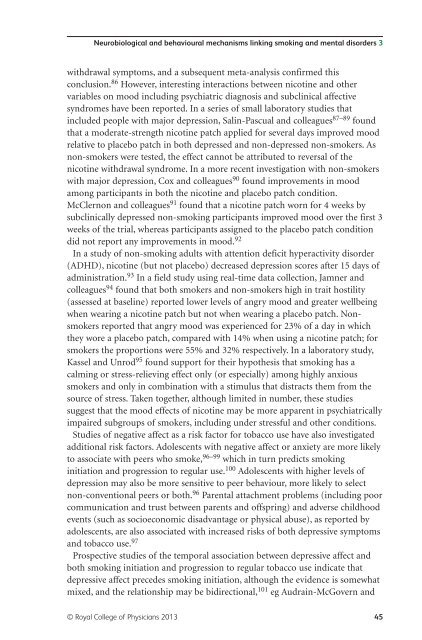Smoking and mental health - NCSCT
Smoking and mental health - NCSCT
Smoking and mental health - NCSCT
Create successful ePaper yourself
Turn your PDF publications into a flip-book with our unique Google optimized e-Paper software.
Neurobiological <strong>and</strong> behavioural mechanisms linking smoking <strong>and</strong> <strong>mental</strong> disorders 3<br />
withdrawal symptoms, <strong>and</strong> a subsequent meta-analysis confirmed this<br />
conclusion. 86 However, interesting interactions between nicotine <strong>and</strong> other<br />
variables on mood including psychiatric diagnosis <strong>and</strong> subclinical affective<br />
syndromes have been reported. In a series of small laboratory studies that<br />
included people with major depression, Salin-Pascual <strong>and</strong> colleagues 87–89 found<br />
that a moderate-strength nicotine patch applied for several days improved mood<br />
relative to placebo patch in both depressed <strong>and</strong> non-depressed non-smokers. As<br />
non-smokers were tested, the effect cannot be attributed to reversal of the<br />
nicotine withdrawal syndrome. In a more recent investigation with non-smokers<br />
with major depression, Cox <strong>and</strong> colleagues 90 found improvements in mood<br />
among participants in both the nicotine <strong>and</strong> placebo patch condition.<br />
McClernon <strong>and</strong> colleagues 91 found that a nicotine patch worn for 4 weeks by<br />
subclinically depressed non-smoking participants improved mood over the first 3<br />
weeks of the trial, whereas participants assigned to the placebo patch condition<br />
did not report any improvements in mood. 92<br />
In a study of non-smoking adults with attention deficit hyperactivity disorder<br />
(ADHD), nicotine (but not placebo) decreased depression scores after 15 days of<br />
administration. 93 In a field study using real-time data collection, Jamner <strong>and</strong><br />
colleagues 94 found that both smokers <strong>and</strong> non-smokers high in trait hostility<br />
(assessed at baseline) reported lower levels of angry mood <strong>and</strong> greater wellbeing<br />
when wearing a nicotine patch but not when wearing a placebo patch. Nonsmokers<br />
reported that angry mood was experienced for 23% of a day in which<br />
they wore a placebo patch, compared with 14% when using a nicotine patch; for<br />
smokers the proportions were 55% <strong>and</strong> 32% respectively. In a laboratory study,<br />
Kassel <strong>and</strong> Unrod 95 found support for their hypothesis that smoking has a<br />
calming or stress-relieving effect only (or especially) among highly anxious<br />
smokers <strong>and</strong> only in combination with a stimulus that distracts them from the<br />
source of stress. Taken together, although limited in number, these studies<br />
suggest that the mood effects of nicotine may be more apparent in psychiatrically<br />
impaired subgroups of smokers, including under stressful <strong>and</strong> other conditions.<br />
Studies of negative affect as a risk factor for tobacco use have also investigated<br />
additional risk factors. Adolescents with negative affect or anxiety are more likely<br />
to associate with peers who smoke, 96–99 which in turn predicts smoking<br />
initiation <strong>and</strong> progression to regular use. 100 Adolescents with higher levels of<br />
depression may also be more sensitive to peer behaviour, more likely to select<br />
non-conventional peers or both. 96 Parental attachment problems (including poor<br />
communication <strong>and</strong> trust between parents <strong>and</strong> offspring) <strong>and</strong> adverse childhood<br />
events (such as socioeconomic disadvantage or physical abuse), as reported by<br />
adolescents, are also associated with increased risks of both depressive symptoms<br />
<strong>and</strong> tobacco use. 97<br />
Prospective studies of the temporal association between depressive affect <strong>and</strong><br />
both smoking initiation <strong>and</strong> progression to regular tobacco use indicate that<br />
depressive affect precedes smoking initiation, although the evidence is somewhat<br />
mixed, <strong>and</strong> the relationship may be bidirectional, 101 eg Audrain-McGovern <strong>and</strong><br />
© Royal College of Physicians 2013 45














